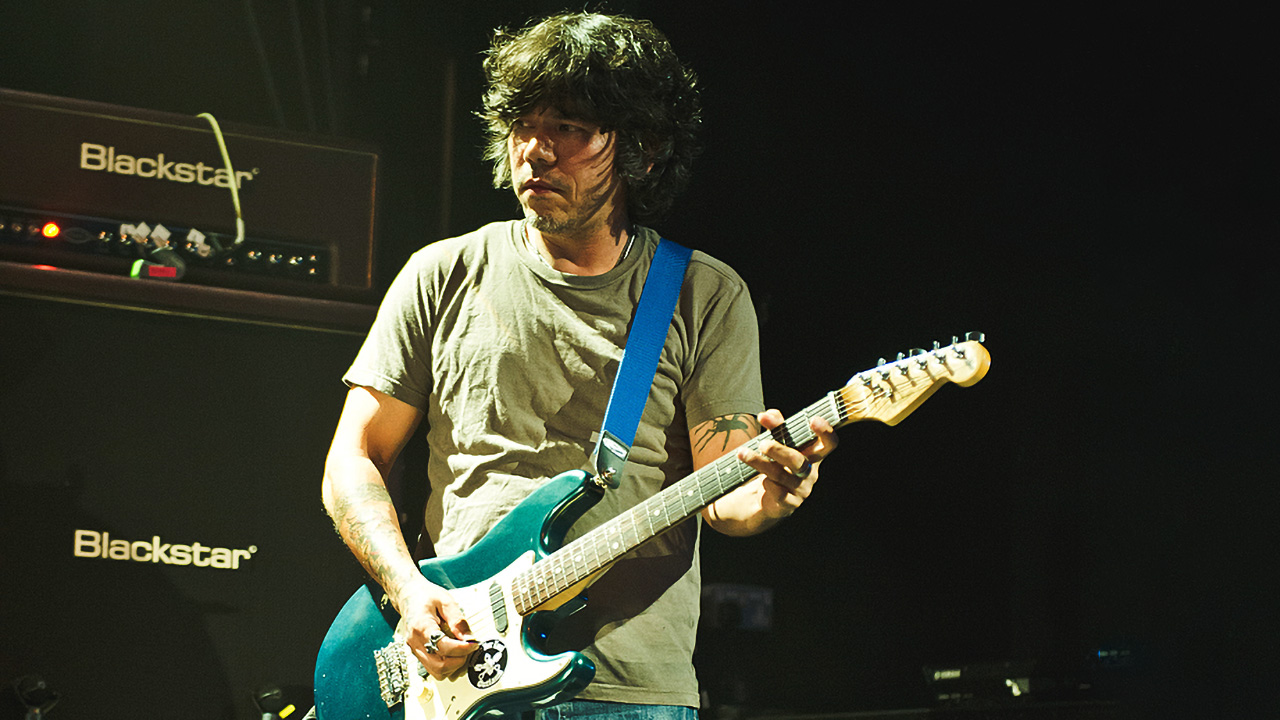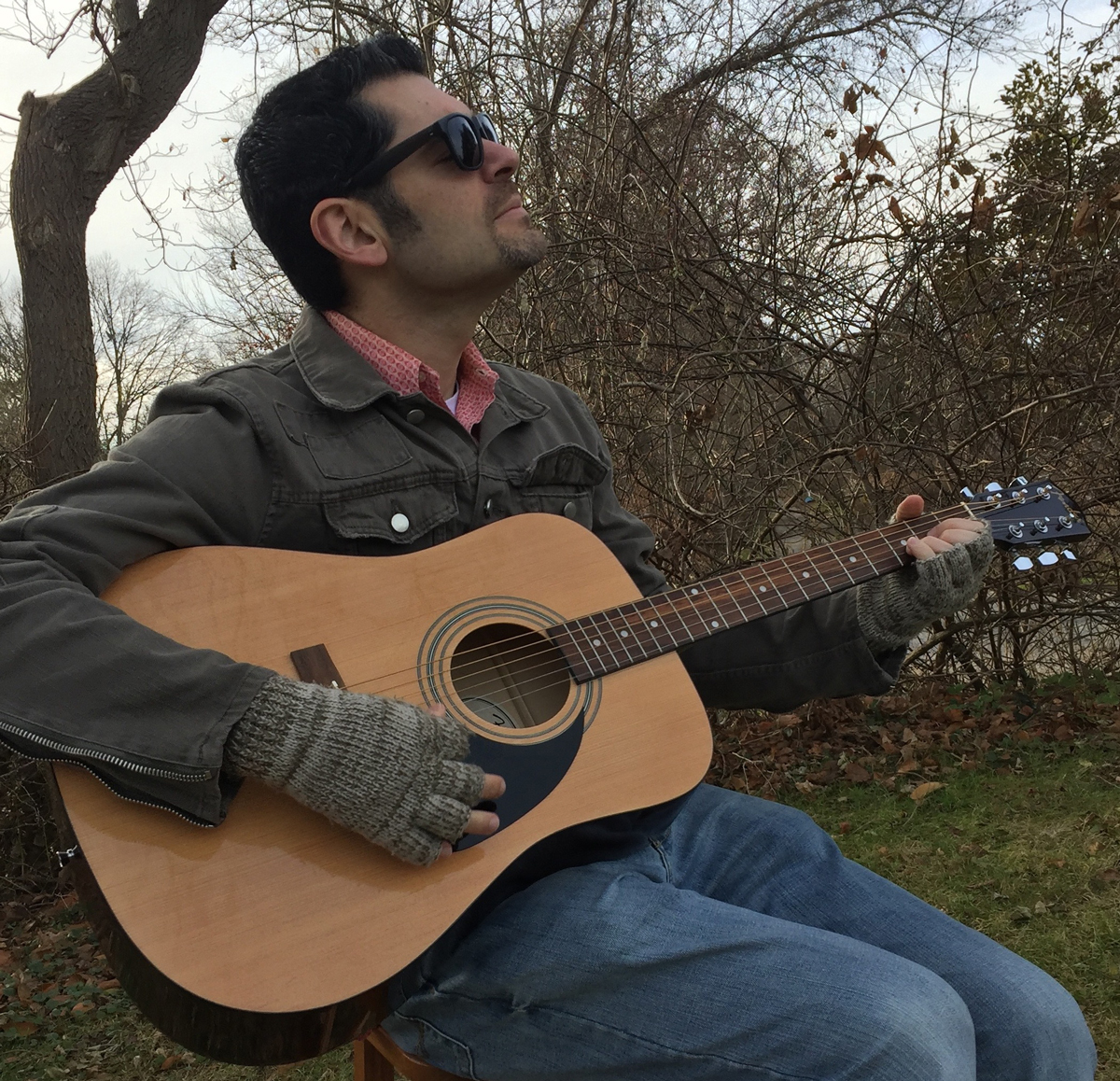“I have that Eddie Van Halen mentality of ‘it doesn’t really matter what it looks like – I wish someone would teach me, because it’s just been me destroying stuff!” David Pajo on modding guitars, Gang of Four and the launch of his lost folk-rock album
The Fender fan, who plays bass and drums on a new ‘lost album’ by Children’s Hour, didn’t realize what an influence Andy Gill had been until he filled the late guitarist’s space

David Pajo is an alt-rock veteran. His resume includes pioneering post-rock with Slint and Tortoise, contributing to the fleeting Billy Corgan-fronted Zwan, serving as a touring member of established bands (Yeah Yeah Yeahs and Interpol), issuing solo albums, and currently, providing guitar for Gang of Four.
Of course, he’s known first and foremost as a guitarist, but for his latest project The Children’s Hour, Pajo has bypassed the six-string in favor of bass and drums – as heard throughout Going Home, an album that was originally recorded over 20 years ago, but is just seeing the light of day now.
And while some opt to take on a hobby unrelated to their main career, Pajo has a soft spot for taking apart guitars – preferably Fenders – and modding them to his own specifications. He figured out to do it entirely on his own, through an admittedly risky “hit or miss” method…
How is it playing in Gang of Four? Was Andy Gill a guitar influence for you?
“I actually didn’t realize what a huge influence he was until I started learning the songs. And they felt really natural. He’s just part of my vocabulary, I feel like.
“I do my version of their songs. I went through and listened to a million different live versions and kind of cherrypicked my favorite ‘Andy Gill moments’ that I wanted to retain. Everything else I just kind of approached my own way – no one can replace someone like Andy [who died in 2020]. He’s so one of a kind.
“I feel like my fingerprint is all over the songs now, but I think I retained the elements that I loved about his spectacular playing. He uses harmonics, he’s not a huge whammy bar guy, he likes single-coil bridge pickups, and that’s it. And I love that approach. It’s very punk rock and basic. He didn’t use a ton of effects, really.
Get The Pick Newsletter
All the latest guitar news, interviews, lessons, reviews, deals and more, direct to your inbox!
“Playing with Gang of Four has been like a dream come true. These songs, I grew up with. I just never imagined I’d be in a position where I’d have to fill his shoes.”
What’s your preferred guitar gear these days?
“I’m so obsessed with just basically assembling all my guitars, and re-doing them all the way that I like them. It’s just finding the right pickups for the guitar, the right capacitors, the right tone pots for them. And I really like treating each guitar as a one of a kind thing – trying to exploit its strengths and minimize its weaknesses.
“To be more specific, it’s primarily Fender guitars. I’ve always been a Fender guy. I’m really specific about what I like.”
Do you have a go-to guitar?
“My favorite guitar right now is a Telecaster that I put together. It’s just super-light and resonant, and the pickups… it’s just a lucky combination.
I’m definitely not a luthier… it’s what I do to de-stress and relax. I turn on the soldering iron and start to destroy everything in my sight
“A lot of times I feel like with guitar modding or upgrading or hot-rodding, it's always a gamble – you don't know what’s going to work together the best.
“But this Tele has a Gemini Goldfoil in the neck pickup – because Teles are notorious for the neck pickup being not as loved as a bridge. And the Goldfoil really is just unbelievable. But it also just matches well with the Telecaster bridge pickup that I have.
“I put a treble bleed on it, and I use 280k pots instead of 250 – just little things to tweak it to where it just sweetens everything. My approach is that not to do major changes; it's little upgrades that have a cumulative effect when you pick up the instrument.
“And I just lucked out. Everything about it just plays and sounds amazing. That’s always my go-to, if I just want to be spoiled when I play guitar. I have a Benson amp that I really like, but I have a different selection of amps here – it depends on what I'm working on.”
Is modding something you taught yourself or did someone show you how?
“I wish someone would sit down and teach me, because it’s totally just been me destroying stuff at home! Since I grew up in the ‘80s, I have that Eddie Van Halen mentality of ‘it doesn’t really matter what it looks like,’ or ‘I’m not precious about anything.’ You can go in there with a chainsaw and just ham-fistedly get it to where it’s close to what you want. As close as you can get.
“I’m getting better for sure, just through trial and error. But I would love it if someone would sit down and show me. I’m not really a YouTube guy too much – y’know, like, ‘The right way to file a nut.’
“I have an idea and I kind of wing it, but I’m definitely not a luthier or anything. I just enjoy it – it’s what I do to de-stress and relax. I turn on the soldering iron and start to destroy everything in my sight!”
Although you’re best known as a guitarist, you provide bass and drums for Going Home by The Children’s Hour.
“I had heard of Children’s Hour because I was interested in music that was coming out of the Chicago School of Folk Music. At the time I was living in Chicago and interested in folk music. I’d seen them based on word of mouth and I loved them.
We recorded really quickly one day. I felt like the songs needed some bass lines as well so I came up with them while we were recording
“At the time, Josephine Foster was playing a harp and singing, and Andy Bar was playing nylon string guitar – classical guitar, almost. And they were amazing. I was playing with Billy Corgan’s band, Zwan, at the time. When we asked them to come on tour with us, I think they were nervous; they'd never played big places before.
“I offered to help out with any music stuff, and we figured that drums would probably be the best thing, because they’d never played rock shows before. And that was a good call, because I played really quiet and muted drums – I like the purity of the sound of Josephine and Andy. I tried to be a timekeeper, basically. A metronome, but also sensitive to the songs.
“So I was double gigging – I’d play drums with them, then I’d run over, warm up, and play guitar with Zwan on that tour. We we ended up being really close and I had the idea that the songs were sounding really good and that we should document it.
“We recorded really quickly – basically, in one day – at the end of the tour at a friend’s place. I felt like the songs needed some basslines as well so I came up with them really fast, while we were recording. And that’s how I ended up playing bass as well.
“We forgot about the recording – I went back out on tour, and they went on to do other things. The only thing that existed was a cassette tape of just the rough mixes that Andy had.
“Then 20 years later, I set out about trying to find the original multi-tracks. The engineer who recorded it found it. We got it mixed properly on analog tape and mastered it. That’s what’s coming out now. It’s kind of a ‘lost album,’ I guess.”
Are there any instruments you prefer playing over others?
“Guitar, really. I think of myself as a guitar player first. Drums are just for fun, and bass I love playing – but bass is such a different role. I like all the instruments I play for different reasons. I think of myself primarily as a guitar player who is kind of a hack at the other instruments – where I’m just getting by.”
- Going Home by The Children's Hour is out on February 23 and available to preorder now.
Greg is a contributing writer at Guitar World. He has written for other outlets over the years, and has been lucky to interview some of his favorite all-time guitarists and bassists: Tony Iommi, Ace Frehley, Adrian Belew, Andy Summers, East Bay Ray, Billy Corgan, Alex Lifeson, Geddy Lee, Les Claypool, and Mike Watt, among others (and even took lessons from John Petrucci back in the summer of ’91!). He is the author of such books as Grunge Is Dead: The Oral History of Seattle Rock Music, Shredders: The Oral History of Speed Guitar (And More) and Touched by Magic: The Tommy Bolin Story.











